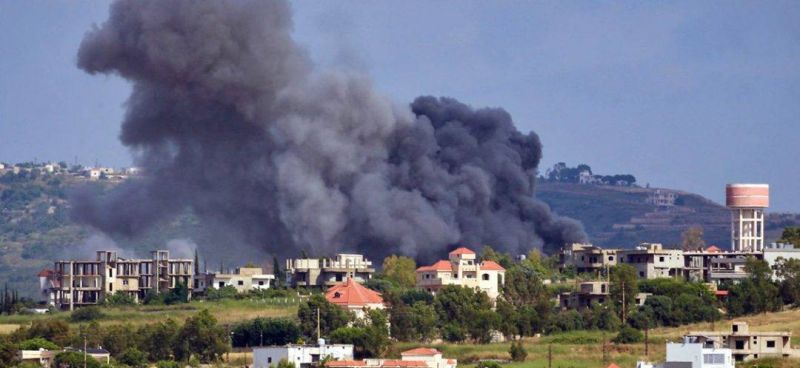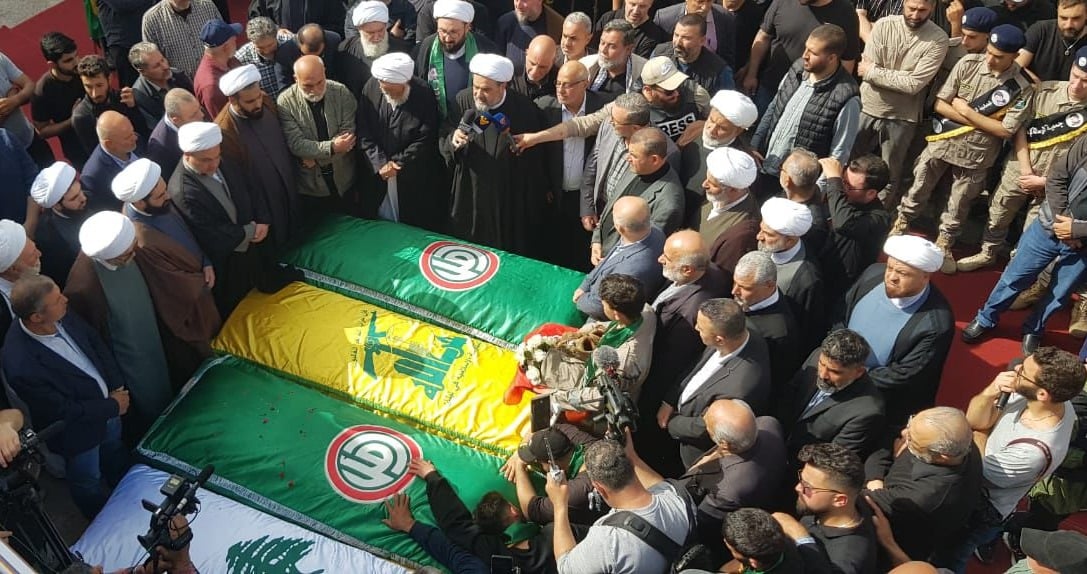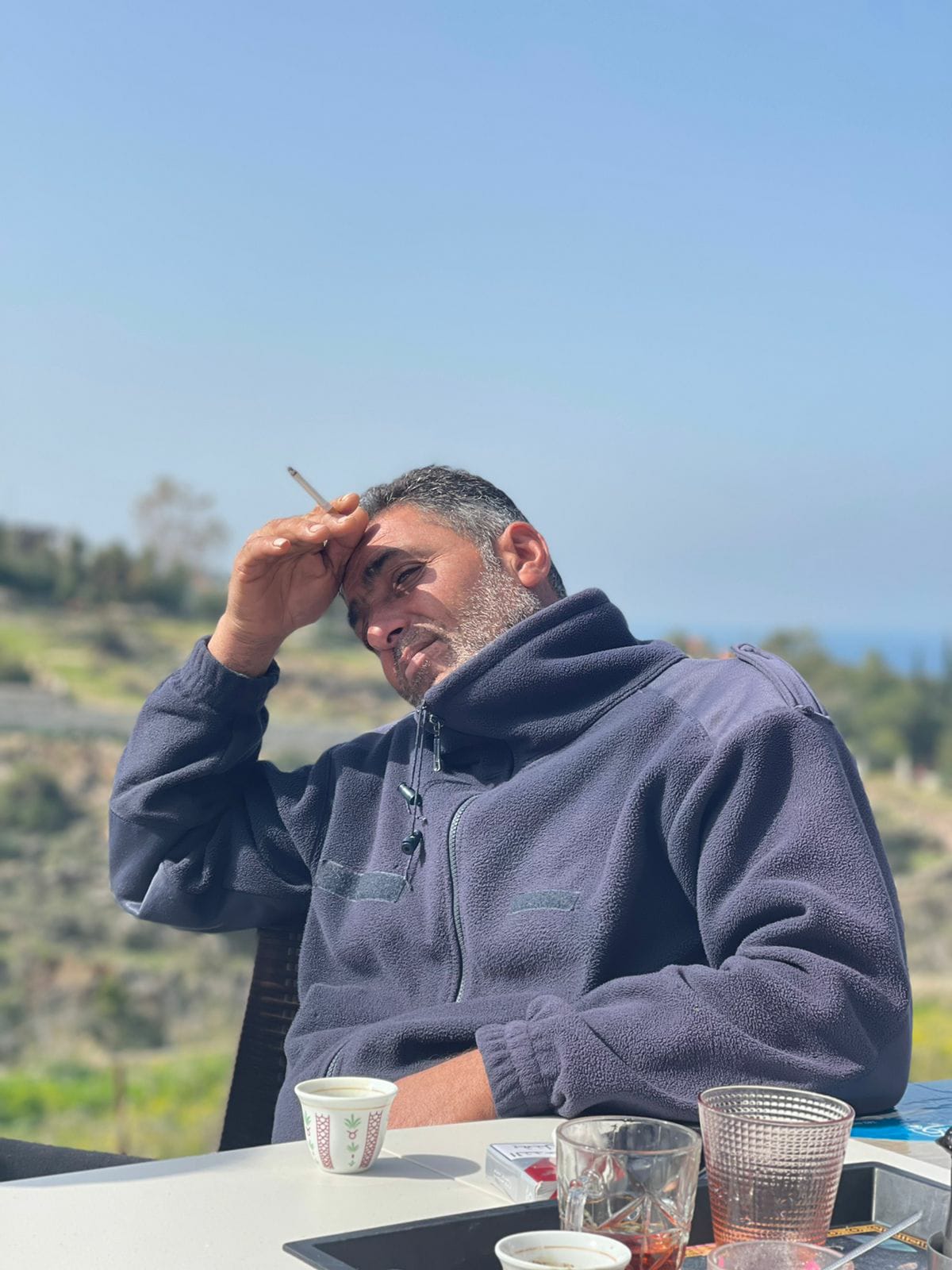
Israeli shelling on Naqoura, Sour district, in May 2024. (Credit: AFP)
BEIRUT — Clear beaches, surrounded by lush green forests, and mountain views: For years, the town of Naqoura in the Sour district of southern Lebanon was filled with tourists and residents enjoying a dip in the clean sea during sweltering summers. However, since Oct. 8, things have drastically changed. The once popular town has become a no-go zone for many, with the majority of citizens fleeing due to Israeli strikes, amidst daily cross-border fire with Hezbollah, which has continually launched rockets into northern Israel in solidarity with Hamas and the war in Gaza.
Life for those who remain in the town has changed remarkably — as residents have been forced to again adapt their lives to the threat of Israeli bombardments.
'I left the café and 30 minutes later my father was killed'
Among the victims of the war that has come to Naqoura's doorstep are three members of the same family: Haidar Joheir, a paramedic with the Hezbollah-affiliated Islamic Health Association, and Issam Joheir were both killed in March, while Hussein Joheir was killed last week.
 Funeral of Issam Joheir, Hussein Joheir and two other people killed in Israeli strike on Naqoura, Sour district, at the end of March. (Credit: NNA)
Funeral of Issam Joheir, Hussein Joheir and two other people killed in Israeli strike on Naqoura, Sour district, at the end of March. (Credit: NNA)
Abbas Joheir, son of the late Issam Joheir, says that his father was killed in late March in an Israeli strike that targeted a café in Naqoura. A group of men had gathered there after iftar "as they usually do during Ramadan nights to smoke and have coffee and tea," he explained.
"My father was a civilian. During his burial, he was wrapped in the Lebanese flag and had no relation whatsoever to any political party. He was killed in a café along with four of his good friends, one of them being his cousin Hussein Joheir."
 Issam Joheir who was killed in late March by an Israeli strike in Naqoura. (Photo sent to L'Orient Today by Issam's son, Abbas Joheir.)
Issam Joheir who was killed in late March by an Israeli strike in Naqoura. (Photo sent to L'Orient Today by Issam's son, Abbas Joheir.)
Abbas explains that he and his father had remained in Naqoura after the war broke out last October, while his mother and younger brother left the town. “My younger brother would get scared of the shelling, and so he relocated along with my mother, and I stayed behind so I would not leave my dad. I had left the café on the day my father was killed to pick something up, and 30 minutes later the café was struck,” Abbas explained, noting that he himself had narrowly escaped death.
Ten people have been killed in Naqoura since Oct. 8, according to Mohammad Awada, one of the town's mokhtars (local officials responsible for records). "Although Naqoura has been targeted several times, it has not, in fact, been targeted more than other towns or villages along the southern border," he said, adding that “all the areas close to the border are prone to Israeli attacks.”
Summer businesses pack up, leaving many unemployed
Abbas Joheir used to own a snack bar near Naqoura’s public beach, selling freshly fried and baked fish, tabbouleh, fattoush, fries and other traditional Lebanese mezze dishes. He also offered a variety of shishas for customers, along with coffee and juices, as well as snacks like chips and chocolate. He also had 30 large beach umbrellas, which he rented out for around $10 each daily for use on Naqoura’s public beach, to which people from across the country and abroad would come to swim or relax.
"Usually around this time of year, I would rent out the same umbrella twice per day and make $20 from each umbrella daily," he explained to L’Orient Today.
"This was a common business for locals and for many, a source of income for the upcoming year. Summers were booming for residents to make money and save for winter when not as many tourists would come to Naqoura. It was also a fun job for many young locals who knew one another, many of whom had grown up in the same town," he said.
"Some of my friends had coffee shops on the side of the road that sold coffee, tea, bottled juice, and cigarettes, and they would make good money in the summer," Abbas continued. In addition, many roaming street vendors would sell boiled corn and lupini beans, known as termos, spiced with cumin, salt and lemon for a few dollars.
According to Abbas, all those business owners have had to leave since Israeli shelling began to affect the town. "They have mainly fled to Sour, with most working in restaurants and as waiters in local cafés. I also know some coffee shop owners who are working as car mechanics. Basically, they are trying to find any job they can get their hands on," Abbas explained. However, not everyone who had left Naqoura had been successful in finding work.
The owner of Yummy Snack, who asked not to be named, told L’Orient Today that his shop "was completely destroyed by an Israeli shell." His business was once well-known in Naqoura for its hot sandwiches, cold soft drinks and its chocolate, chips and biscuits.
"There is nothing left of my business. Israel destroyed it, and I’m currently unemployed," he said.
'UNIFIL is acting as a deterrent force in Naqoura'
Naqoura is also home to the headquarters of the United Nations peacekeeping force, UNIFIL. The force, too, has noticed how the town has changed. "Naqoura is almost empty of civilians who had to be displaced," spokesperson Andrea Tenenti told L’Orient Today.
In mid-October, almost a week after the cross-border fire between Hezbollah and Israel began, UNIFIL said that its headquarters in south Lebanon had been hit by a rocket.
“Our peacekeepers were not in shelters at the time. Fortunately, no one was hurt” UNIFIL said in a statement.
“Since Oct. 8 there have been some incidents. We had three slightly injured [UNIFIL] personnel [in March,]” Tenenti noted. This was as a result of an "explosion" along the Blue Line, the demarcation line between Lebanon and the Israeli state, which injured three United Nations observers and one translator, UNIFIL said in a statement at the time.
The security measures currently taken by UNIFIL, some eight months after the war broke out, are “the same measures we have been taking since Oct. 7. We have over 560 bases along the Blue Line, and [these] are of the same importance to us as the headquarters in Naqoura and as that of the local population,” Tenenti said.
“It's important for this conflict to end with a political solution to put an end to damage, devastation and death in the area,” Tenenti added.
Tenenti assures that UNIFIL is not only concerned with the safety of their peacekeepers but also with the safety of the local population. He insists that UNIFIL will remain a “deterrent to an escalation, and our activities are one way of deterring the escalation of the conflict.”
“We have not documented any tension whatsoever with locals in Naqoura since Oct. 8, and we continue to do our activities like before. Our relationship with the mayors and locals remains normal," he added.
He also noted that "people have fled" most of the villages close to the border, so there are "only a few people left in those specific villages."
"We need to find a solution to support international efforts to bring stability to southern Lebanon,” he concluded.
Hezbollah has repeatedly insisted that its role is a "deterrent force against Israel"; however, the party was not available to comment to L'Orient Today on the matter at the time of the publication of the article.



